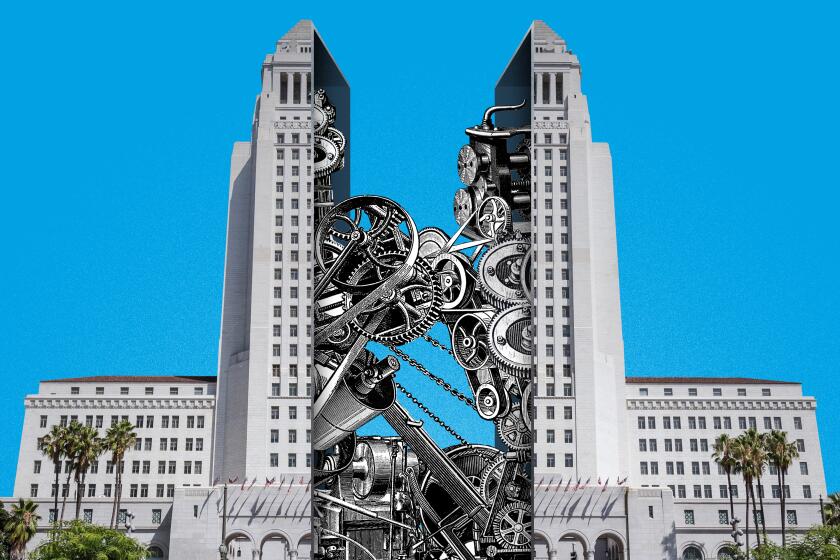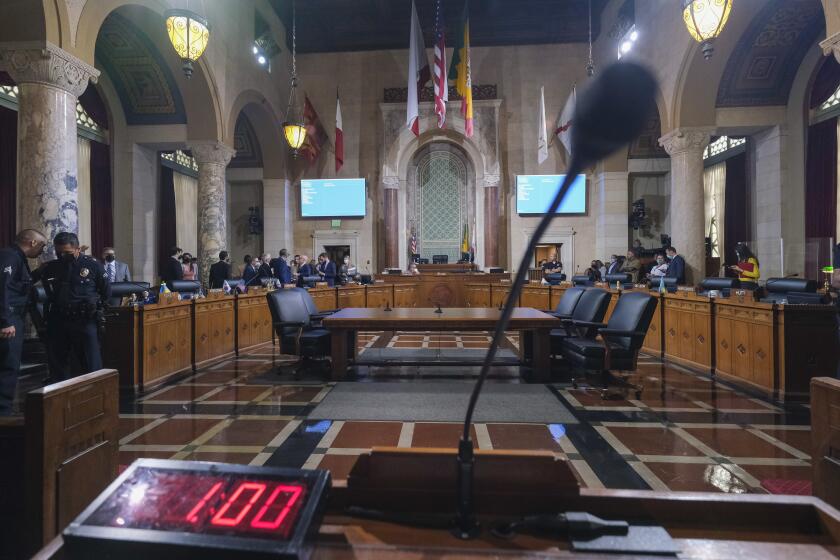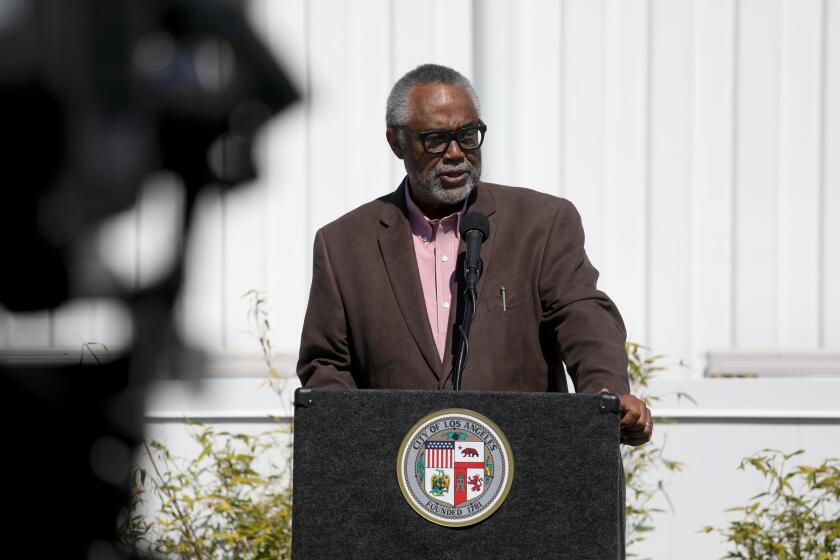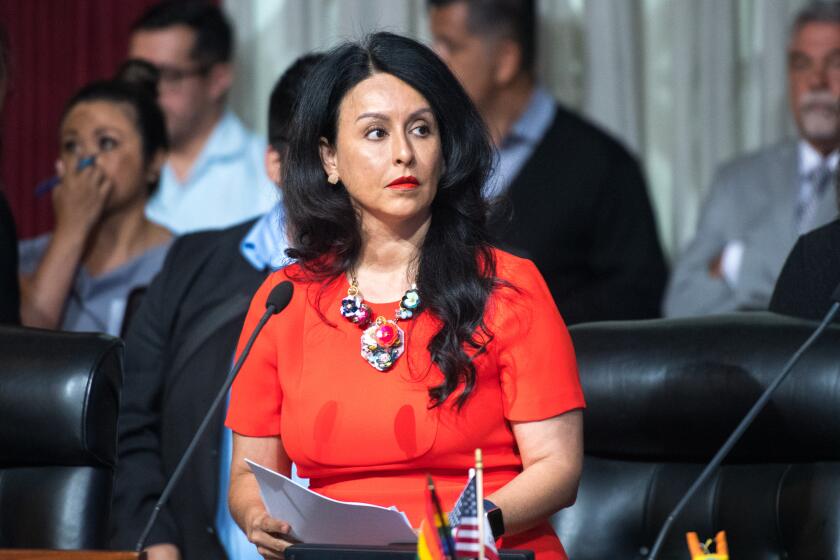Editorial: L.A.’s broken government needs change. Voters shouldn’t have to wait until 2032 to get it
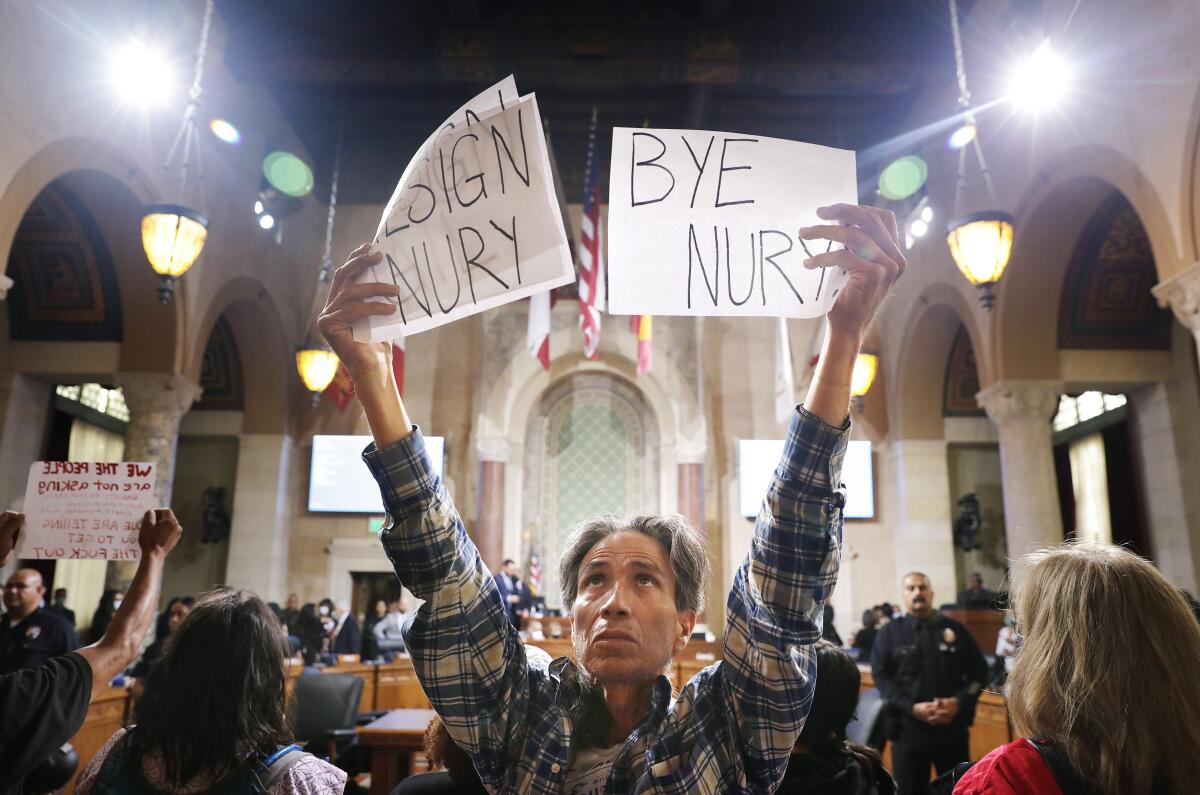
- Share via
A year ago Los Angeles City Hall was rocked by scandal. A secret audio recording captured three council members making deplorable and racially divisive comments about their colleagues and constituents as they plotted for political power.
Coming on the heels of multiple city leaders indicted for corruption, the leaked audio showed just how toxic L.A.’s political leadership had become and it kicked off a movement to transform City Hall. Two long overdue reforms — adopting an independent redistricting commission and expanding the City Council — are being planned for the November 2024 ballot.
Los Angeles City Hall has been rocked by scandal after scandal, but now there’s momentum to reform city government.
But under the plan being developed by the City Council, the reforms, assuming they are passed by voters, would not take effect until 2032 — a decade after the scandal.
That’s too long. Angelenos should not have to wait eight years after they vote for reforms to take effect. Eight years! Think of how much a city can change in that time. Eight years ago, Eric Garcetti was still the newish mayor of L.A. and the city was beginning to acknowledge its homelessness crisis. Barack Obama was president.
City leaders should be looking to implement independent redistricting and council expansion for the 2026 or 2028 municipal elections.
Voters will likely be asked to support expanding the City Council. The question is how big and how bold that change should be.
Yes, tying reforms to the 2026 election would create some challenges. The city would have about one year to impanel its first-ever independent redistricting commission and then have that commission draw new district lines for an expanded council. (How many council districts to add is still being debated.)
That’s a lot of change and decision-making on a compressed schedule. But it’s certainly possible. California’s first Citizens Redistricting Commission was appointed in December 2010 and completed new congressional and state legislative district maps by its August 2011 deadline.
Three decades of oversight and enforcement have revealed the commission doesn’t have the independence and authority to be the watchdog that Angelenos need or expect.
A fast turnaround would have benefits, too. It would demonstrate that government can deliver meaningful change quickly. Plus, it would take advantage of this rare moment in L.A. political history. Wonky public policy issues, such as redistricting and council representation, are hot topics thanks to grassroots organizing and education that started during the 2021 botched redistricting process and gained steam after the leaked audio scandal.
OUR LA, a coalition of community groups and racial justice advocates, has been holding meetings across the city to gather input on reform. Nearly all residents favor a faster timeline, organizers said, but they also don’t want to cut corners on selecting and training commissioners, public outreach and input on line drawing.
What L.A. city councilmembers failed to grasp as they strategized to benefit Latinos at the expense of others is that Latinos are not a monolith.
Delaying implementation until the 2028 election would allow more time to do outreach and draw new district boundaries. The downside is that 2028 is close to the city’s regularly scheduled redistricting process in 2031 based on new census population figures, meaning the city would have to redraw the lines again for the 2032 election.
Political disruption, however, is not a good reason to delay reforms. Council members pushing for 2032 argue the city will need more time to prepare, particularly if voters approve a larger council that will require reconfiguring the council chambers and office space and other logistical changes. Of course, there’s also self-interest. If implementation is delayed to 2032, 10 of the council’s current members would retain the ability to run for reelection in their existing districts two more times, Times reporter David Zahniser wrote.
Good government groups, such as Common Cause, make a sound argument that waiting till 2032 would give the city time to educate and involve residents in shaping these major changes.
Sara Sadhwani, an assistant professor of politics at Pomona College, served on the state’s independent 2021 redistricting commission. She’s wary of a rushed redistricting. The state set a slower pace for its second commission; the application and selection process alone took nearly a year. That helped ensure a diverse commission and allowed time for community input and deliberation, she said. The commission adopted the new congressional and state legislative lines unanimously and there were no lawsuits challenging the maps.
Whether city leaders pick 2026, 2028 or 2032, there will be tradeoffs. In this instance, we believe the case for City Hall overhaul is clear and Angelenos are better served by making change happen sooner.
More to Read
A cure for the common opinion
Get thought-provoking perspectives with our weekly newsletter.
You may occasionally receive promotional content from the Los Angeles Times.
